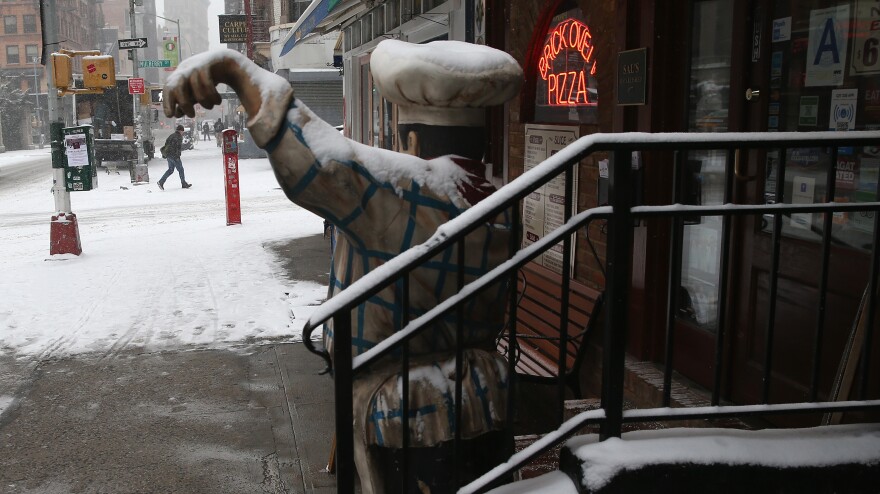The economy often absorbs the impact of snowstorms, such as this week's storm, without much trouble, but this winter the weather is doing more damage than usual.
Sal Sambataro, the manager of Il Cortile in Manhattan, says that when the weather is better, people are packed into the family-owned Italian restaurant. On a recent day, though, the temperature is close to 15 degrees and the doorman wears a furry hat. Business is slower than usual.
"Business is off about 50 percent because of the weather," Sambataro says. "People don't want to go out. They don't want to go out in the ice and snow and the storm."
He says it's been tough, as rents keep rising though business has been lower since the recession. It's not just the weather: A look outside Il Cortile's window will show you the impact. Sambataro counts four For Rent signs across the street.
"All that went out of business this year," he says.
If somebody needs a new car or a bigger house, bad weather might keep them home for a while. But they'll eventually buy. With restaurants, it's different.
"If you stay away a week or two, that doesn't mean when the snowstorm is over with that you'll start eating hamburgers at double the pace," says Chris Christopher, an economist with IHS Global Insight.
Restaurants, airlines, hotels and many other businesses are losing sales this winter, Christopher says. The good news is that people do buy things they want or need, they just might do it when it stops snowing.
"Most things, they do recover quite a bit," Christopher says.
Still, a big problem for economists is that much of the data is hard to decipher, such as job gains and figures on overall national economic growth. Perhaps we're blaming too much of that on the weather.
Chris Mayer, who follows housing as an economist at Columbia University, agrees.
"There's no statistical way to figure out, to disentangle two things," he says. "So we've seen existing home sales fall over the last six months."
How much is that the bad weather and how much are other factors, such as rising interest rates that make it more expensive to buy a house? The tight credit and challenges people have getting into the housing market could be biting harder, and there's just no way to know.
For the moment, trying to figure out the direction of the economy is like sailing through the fog; we won't really know what course we're on until we get past all this bad weather.
Some experts say the weather has cost the economy billions of dollars, but it's hard to say exactly how much.
Copyright 2021 NPR. To see more, visit https://www.npr.org.



